Melody Horrill: How I overcame domestic violence – and a dolphin changed my life
Former TV weather presenter Melody Horrill has opened up on the shock domestic abuse she has suffered – and the surprising way she has healed her heart.
SA Weekend
Don't miss out on the headlines from SA Weekend. Followed categories will be added to My News.
Much-loved former Adelaide weather presenter Melody Horrill has shared the harrowing and deeply personal story of watching her father viciously attack her mother and then harm himself, the pain and anxiety that caused, and how a Port River dolphin called “Jock” finally helped get her life back on track.
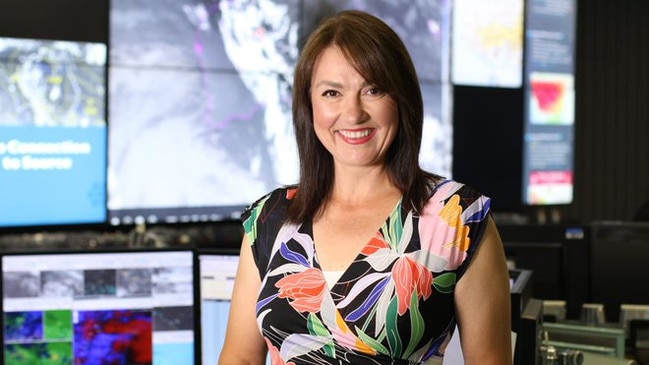
THE AMAZING CREATURES
When a dolphin checks you out, you can feel it.
The sonar dolphins use to work out an object’s size, shape and density sends out waves that reverberate through the body and cause a very strange sensation.
“It feels like your insides are jingle jangling, you feel the vibrations inside you, it’s really weird,” says Melody Horrill, whose close relationship with a Port River dolphin, Jock, rescued her from her damaged life. “You just intrinsically know you’re being checked out; you’re being examined.”
Horrill was, for a time, the face of Channel 7’s weather and was a well-known Adelaide environmental journalist with stints at the ABC and Channels 9 and 10. She is the sort of TV personality you think you know, just because her face is so familiar. What the public never suspected was that behind the cool, professional exterior was a damaged younger woman carrying the scars of family violence and dysfunction that were so extreme you wonder how she got where she did.
“Yes, it was difficult,” she says on a visit to Adelaide from her home in Melbourne. “But I think I realised I had to be brave.”
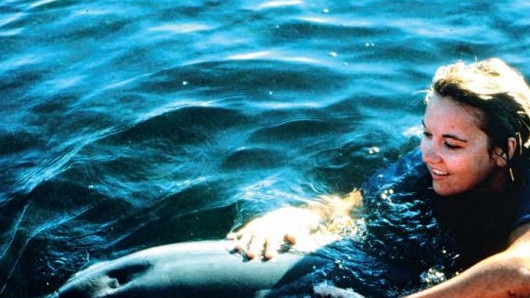
A HORRIFIC CHILDHOOD
In her book, A Dolphin Called Jock, Horrill lays out the horrors she lived with growing up in Adelaide, where she went to Brighton High School and Muirden Senior College. She writes about the private struggles and anxiety behind her TV smile and how the unexpected trust and joy she experienced in the water with Jock and the other Port River dolphins gave her the courage and self-belief to build a life. After early years in Cornwall, she came to Adelaide as a young girl with her father, who had Sri Lankan heritage, and her English mother, a handsome if vain woman 14 years his junior. Horrill and her brother, Mark, were the particular target of cruel taunts from her father, which included a repeated, false claim that she and Mark weren’t his. After one nasty fight, her mother left, handing her daughter a lavender-scented handkerchief “to remind yourself of me”. She came back a few days later as if nothing had happened and life went on.
For a time, family life in Adelaide followed a tortured cycle of a violent confrontations between the parents followed by periods of uneasy calm. The police came regularly, but nothing changed.
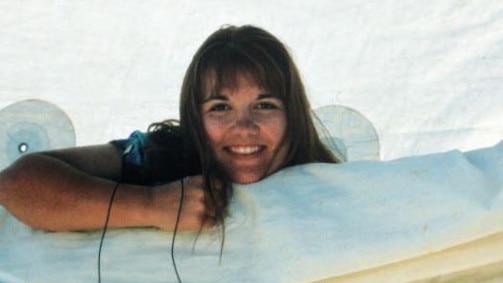
As her parents’ relationship deteriorated, Horrill moved with her mother to a flat but he followed them there and started stalking them, sometimes in amateurish disguise. Horrill remembers obsessively checking the locks and peering through the curtains into the street, always frightened that he might be there.
“A man was sitting on a motorcycle parked on the side of the road,” she writes of one encounter. “He was wearing a red helmet, its inky visor facing towards the flat. He lifted the visor. It was my father.”
The disguises might have been ludicrous – fake beards and glasses – but her anxiety skyrocketed because she never knew where he might be. One day her mother said that, following the advice of the police, she would move out. “I’m the one he is obsessed with,” she told her. Horrill was joined by a close friend and her mother moved in with a new boyfriend.
A few months later, in April 1986, her mother came for a visit, bringing back some freshly washed sheets. At Horrill’s front door, her father suddenly loomed out of nowhere and launched himself at her mother, grinding a corkscrew into her face. Her mother screamed and collapsed and Horrill ran inside to call the police to report the stabbing. Her father, meanwhile, had slashed his throat with a carving knife and was lying at the entrance, in an expanding pool of blood.
After medical help arrived and the police were there, she was huddled in a corner gripped by trauma. A policeman came over and put an arm around her. It was going to be all right, he said, your mother is going to be OK, the corkscrew had missed her eye, and her father was on his way to hospital. Then he introduced himself as Detective Dunstone.
“You can call me Peter,” he said.
His compassion for a young woman at her lowest meant everything and it was a small push forward on to the path of believing that maybe, one day, everything could be all right.
Decades later, they are friends after she contacted Dunstone last year to thank him for the warmth and support that helped her get through what followed.
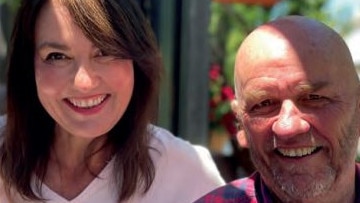
Her father survived and Horrill had to give evidence against him while he abused her in the courtroom. After he was jailed, her brother persuaded her – against her better judgment – to visit her father in prison, where he claimed to have found God, but the facade quickly dropped and she came away unconvinced. He took his own life the week before she was doing her year 12 exams, inflicting one final act of hatred.
Horrill remembers her year 12 teacher asked if she wanted to put off her exams. “I said, ‘No, I’ve come this far,’” she says. “There was just a turning point in my life where I realised I had to drag myself out of these dark patches.”
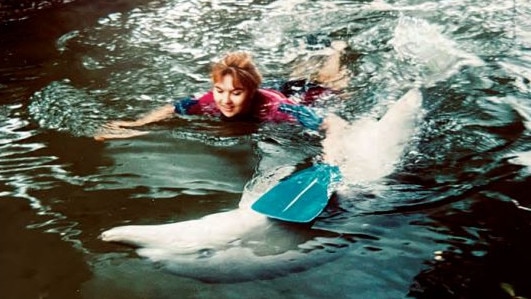
MEETING JOCK
Through sheer determination, Horrill set herself on a path that in 1990 took her to University of South Australia to begin a Bachelor of Communications degree, majoring in psychology. She was traumatised, and writes of the nausea and hammering heart that almost overcame her on the drive to uni.
She was the first person in her family to go to university and she was terrified of failure, worried she wouldn’t fit in and that she would never be good enough. The one subject she was looking forward to was introductory psychology and her lecturer was Dr Mike Bossley.
“I was nervous about approaching Mike because my father had always told me I would never amount to anything and I may as well give up. That had been drilled into my brain for as long as I could remember,” Horrill says.
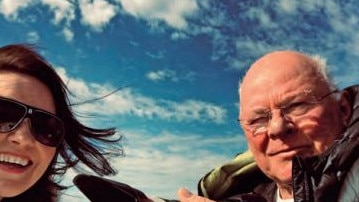
But there was something about Bossley, a marine biologist who was fascinated by the Port River dolphins, that didn’t fit the mould of the aloof professor. In his second lecture, he talked about the way man’s dissociation with the natural world was becoming a problem for mankind and for the planet. He showed slides of dolphins kept in marine parks who showed clear signs of psychological distress. He also talked about the Port River dolphins and how he had been studying them for some years.
At the end of the lecture, Horrill went up and asked if he ever took students out on the Port River. “Well, it’s funny you should ask that, Ms Horrill. I need another research assistant,” he said. It was a sliding doors moment, one that lifted Horrill out of herself and her past and into the water with dolphins, who over the next three years taught her life lessons that changed the trajectory of who she would be.
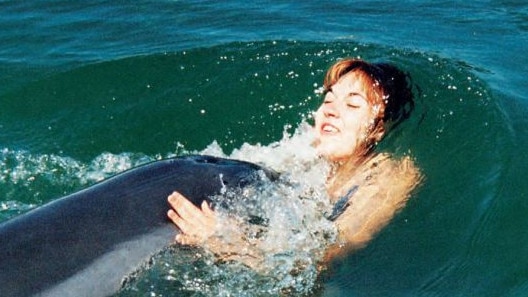
She writes in the book of what it was like being around Jock, feeling his cool, satin skin. One day, just as she began to climb the ladder back into the research boat, he pushed his snout into her hand and purposefully kept it there while he suspended himself out of the water, staying in place with the slightest tail movement, dancing in front of her.
“I’m shocked at how rough (his snout) feels, quite unlike his satin body,” Horrill writes. “His snout feels like sandpaper and his mouth feels lumpy and scarred.”
She finds out later the scars are from discarded fishing hooks that had lodged in his gums but that is the least of it. Jock was easily recognisable in the water by his mangled dorsal fin, the result of multiple entanglements in abandoned fishing nets and lines that cut deep into his tissue from when he was an infant.
The deformities had themselves made him more prone to getting tangled and he was only now an adolescent.
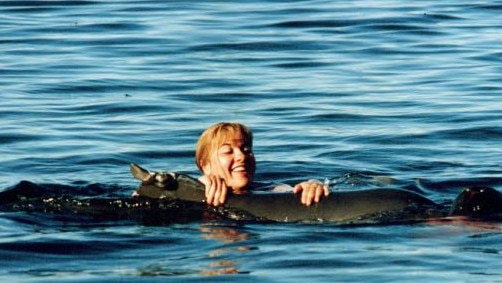
His injuries were all traceable back to man, and yet there he was greeting Horrill in the water, inviting her to be a friend, to come and play. He was also different to the other dolphins. He lived apart from them and was too scared or damaged to go out into the main river.
“When I first saw him, I saw myself in him in many ways,” Horrill says. “He appeared not only so physically damaged but his behaviour was so different, he seemed so lonely. It seemed so very sad and I felt this massive empathy for him and a connection to him.”
She and Bossley, and another assistant called Steve, would find Jock in a channel on his own, not part of a family group or pod. Other dolphins would approach him in a friendly way and he would make it as far as the end of the inlet then lose his nerve and turn back, too scared to enter the open river. He had been interacting with Bossley for some time, playing games with a stick or paddle and letting himself be touched but he was not living as a dolphin should. Horrill felt an immediate kinship.
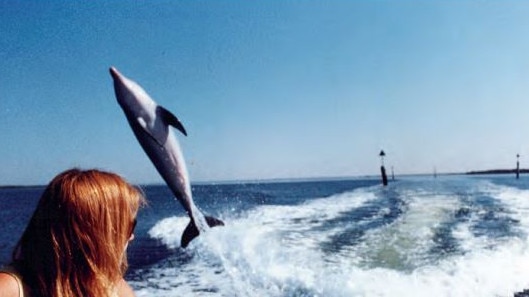
“It’s clear that humans, including myself, fill a gap for Jock. For me, however, Jock was filling a gaping hole in my own heart,” she writes.
On their research trips on to the river over the next three years, they would motor into the channels and check on Jock first, say hello and play around for a bit before setting off to do the real work. A few people knew about Jock, but not many, and Bossley was keen to keep him a secret.
The healing effect he had on Horrill wasn’t immediate but the real shift in her began then. Look at the photos in the book and you can see why: Horrill is radiantly happy in the water with Jock, gently interacting with him, touching his skin and letting herself be propelled backwards in the water as Jock pushed her. He decided he wanted to play this particular game, she says, all she could do was let it happen.
“He did bond with me; I think we did bond. Obviously, Jock had interactions with other people but this story is all about my connection with him and how he seemed to connect with me,” she says.
There was a private metamorphosis going on. She could sense that she was learning things and felt joy being with all of the dolphins but the changes were so personal she never really spoke to anyone about it. Bossley knew a little of her history but she never told him what she was feeling.
“I didn’t talk to Mike about it, how could I?” she says. Her boyfriend didn’t get it and her mother was just happy that she was happy. She loved Jock, pure and simple, and he seemed to love her back. It was this experience of unconditional love, something she never had as a child, that made her see the world differently and realise it could be a better place than the one she knew.
“To have a completely wild dolphin put their trust in you is completely remarkable, it blew my mind,” Horrill says. “This wild mammal trusted me and I trusted him. For the first time I felt real trust because I pretty much felt as though I had been let down by everybody.”
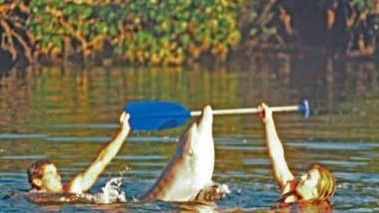
Jock loved to play, he lived in the moment, he was damaged but he was also capable of love and trust and joy. Horrill could see how in her daily life she was either caught up in her past or worried about her future. On the river with the dolphins, she learned to love being in the moment.
She was aware of the changes but at the time could not have articulated it. She would sit in the boat or be in the water and feel little sparks going off in her brain. She would look at a mother dolphin and the total devotion she showed to her calf and it would trigger something new. The same with the family groups who played together, some of them tail walking in a trick introduced by a dolphin, Billie, who spent time in captivity and was thought to have watched trained dolphins do it. She would also see the same groups turn into a lethal strike team, herding fish towards shore and into the shallow water to make them easy prey.
“I knew I was changing,” Horrill says. “I probably couldn’t have put my finger on the one thing that was making it happen but I could feel myself evolving. I knew that I was learning lessons.”
They became her family during that time and Horrill took her first concrete step into public life by setting up, with Bossley, the Australian Dolphin Research Foundation.
She became a spokeswoman and advocate for the dolphins in the Port River. Channel 9 became the foundation’s first sponsors and she began doing dolphin stories for TV, then broadened her journalism into other environment issues such as kerbside recycling, which was being rolled out. “I started going on daytime TV, they wanted me to talk about other things – the environment, catchments, worms, birds, recycling,” Horrill says.
She found her voice. After being told for so many years she had nothing to say and never would, now she was speaking and people were listening. “It was remarkable, I couldn’t believe it,” she says. “I still felt that I wasn’t good enough to do it but it was important, so I would do it anyway. To have that voice was life-changing for me.”
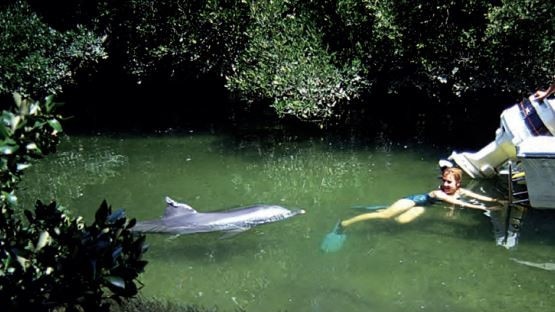
FRIENDSHIP COMES FULL CIRCLE
Jock taught Horrill another memorable lesson. He would follow Bossley’s boat to an invisible border that marked the limit of his safe haven but Bossley decided to build his confidence in the hope he might one day swim into the river. Jock followed the boat further each time, doing tricks in the air, flinging himself into the sky and flopping back into the water before Bossley would turn the boat around. One day, he led Jock on and kept going. A pod surrounded him, their sonars going off madly as they checked each other out. Then Jock went back to his haven.
It happened a few times and then, one day when they went to the channels, he was gone. The next time they saw him, he was swimming among other dolphins and had no interest in playing with Horrill or the boat.
“Well, I guess this is quite the day,” said Bossley, tears in his eyes.
It was a lesson hard won, but important. “When he went out of his comfort zone and met the other dolphins, he taught me about bravery, about how to leave the area,” Horrill says. “I learnt all about the necessity of doing that because I saw Jock do it.”
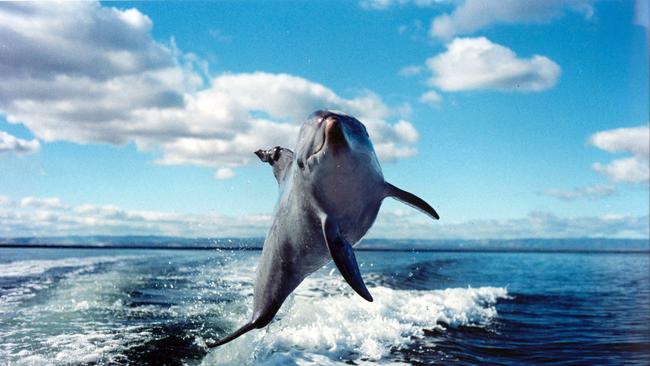
She fell into being the Channel 7 weather presenter after working at channels 9 and 10 doing mainly environmental stories. Whenever she changed jobs and went to another network, the dolphins went with her and she would have written into her contract their sponsorship of the foundation. While at Channel 10, she was asked to make a documentary and decided it had to be about the Port River dolphins – not her personal story but a more dispassionate piece about what how unusual it was to find dolphins living harmoniously so close to industry and to people.
“The story was really about the Port River and why it was such a special place and why we must protect it,” Horrill says. “I remember sitting in a room with old tapes of me with Jock and it was a reflective moment for me because I realised how much I had learned from him and the other dolphins in the river.”
The documentary was picked up nationally and then CNN bought it, resulting in a trip to Atlanta and a personal meeting with one of the documentary’s fans, CNN head Ted Turner. Partly because of that, and the generally higher awareness of the significance of the dolphins, in 2005 the Rann government declared the Port River the Adelaide Dolphin Sanctuary.

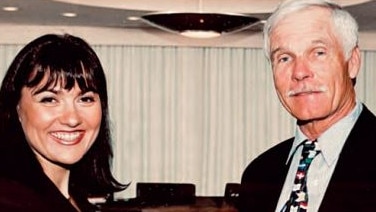
One day, when her friend Jane Reilly was on leave, she was asked to step into her role and present the weather on Channel 10. “You’re a natural fit Mel,” her chief of staff said. “You do all the environmental stuff.”
As a result of occasionally filling in, she was approached by Channel 7 to be their full-time weather presenter and took the job because its ratings were higher and she could reach more people, again on the condition they sponsor the foundation. She became a nightly fixture at the end of the news, giving an informative rundown of the weather and what lay in store.
“I was happier in myself and I always felt so grateful,” Horrill says. “Sometimes I would think, ‘How did this girl from Brighton who was a bit lost, dealing with these issues, end up here?’”
After moving to Melbourne in 2014, where she worked until last year at the Bureau of Meteorology, Horrill, 53, has decided to use her voice again, in a book that has already got a US publishing deal. This time, she is telling her very personal story and she did it not just to continue her support of the dolphins – who are still afflicted by mysterious illnesses despite the sanctuary – but also to inspire and encourage others who might feel as lost as she once did.
“It is easy to feel enveloped by hopelessness,” she says. “I’m not saying I have the answers but I am saying I found some light through the total unconditional acceptance of a dolphin and his mates. For me, that was my salvation.”
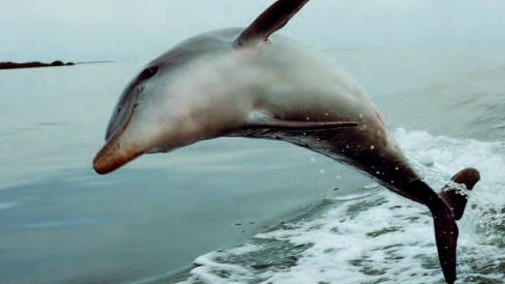
BOOK EXTRACT
‘Can you hear me, Mel?’
The voice is coming from the small rubber bug lodged in my ear.
‘Yep, loud and clear’ I answer, ‘Can you hear me?’
‘Yes, ten seconds to air and remember to throw to your dolphin report at the end.’
I adjust my shirt, breathe deeply. I can feel my heart thudding against my ribcage. Even after years of presenting Adelaide’s weather every weeknight, I can still feel tendrils of anxiety prodding at my core. I have a lurking fear that they will coil, constrict, and trigger a panic attack. It’s happened a few times before. Somehow, I managed to get through my presentation instead of running out of the studio.
I glance up at the lights. Their warm glow feels familiar, even soothing. ‘Yes, I will be fine tonight’ I tell myself. I launch into my script, animatedly chatting and gesturing to the inanimate, mechanical cyclops in front of me. I flash back briefly to the first time I saw a news camera. It was perched on the shoulder of a bulky man who’d turned up at my flat after my father viciously attacked my mother then tried to kill himself. I hated that fathomless black lens following me as I was led by the detective away from the crime scene. All these years later I’m talking to it like an old friend, I even like it as I know it’s connecting me to people at home who are watching, listening. I feel so grateful and humbled that they even bother. I’m constantly astonished by their loyalty.
I have been a weather presenter for almost ten years and an environment/science journalist on TV for close to two decades. I finish tonight’s segment talking about the latest baby dolphins born to the Port River pods. I feel the grin lift my cheeks; I hear the delight in my voice. I love the dolphins and have worked hard to ensure that every television job I’ve ever had allows me to highlight and support these amazing mammals which live right on Adelaide’s doorstep.
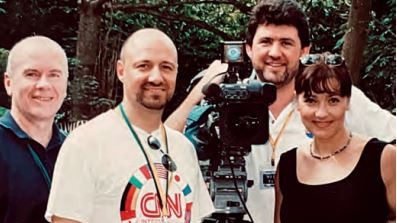
I had never planned a career in television. My passion to help protect the Port’s dolphins had set me on a course I felt constantly amazed to be on. I felt I never fitted the traditional TV mould. I was an outsider, an ordinary interloper who had somehow stumbled into an extraordinary realm. But I was determined to master my craft, use it to highlight important issues and provide people with meaningful information. I was proud of my achievements.
But my sunny, confident TV persona disguised a fear that I’d never amount to anything. As a child, my father reminded me of my uselessness during the times he even bothered acknowledging my existence. Of course, he also noticed me when I threw myself between he and my mother during the awful brawls at home.
During what seemed like an endless cycle of tension and violence, I often felt adrift and alone. I struggled to understand the darkness which had enveloped my life. As I grew older, I realised partying was not the answer and the only way I could change my life was by continuing my education. I started at university.
Through this, I met the love of my life – a Port River dolphin called Jock.
I volunteered to be a research assistant on a dolphin project in Adelaide’s Port River. On my first trip with marine biologist, Dr Mike Bossley, I saw Jock’s fin, disfigured from nets and fishing line, circling a small boat moored in a channel. He seemed disconnected, scarred, lost. I wondered if he’d been abandoned or orphaned. I immediately felt a profound connection, one which, in time, would help me explore my own scars and heal from them.
During the following years I came to know Jock and his home intimately. Where he and the other dolphins lived is a jarring contrast of stunning, natural beauty and a busy, commercial waterway in which Adelaide’s wastewater and other pollutants end up. While industry lines many of its banks, some parts of the river seem so remote and ethereal it’s hard to believe the waterway lies only twenty kilometers from a major capital city.
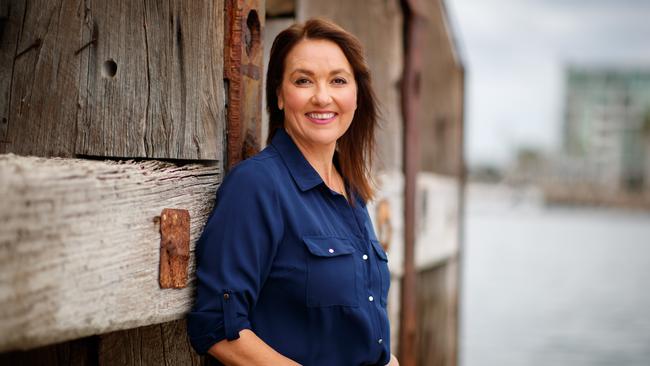
Dr Bossley has studied the resident dolphins in the river for years and knows many of them by name. While most have adapted to living with human activities, too many have fallen victim to pollution, boat strikes, entanglement, disease and even deliberate attack.
Over the space of almost three years, I grew to know and love the dolphins. They became my family, watching their lives helped me reflect and understand my own. They helped me rediscover joy and the importance of existing in the moment. But Jock was special, he became my most important teacher.
When I first plunged into the murky depths of the river with Jock, I feel both exhilarated and immediately at peace. His skin felt like silk under my hand. He allowed me to stroke his snout, I noticed lumps of scar tissue around his mouth – the result of fishing hooks lodged in his gums. He gently nudged me. I felt completely accepted. At the time, the feeling was foreign yet liberating.
I spent countless hours in the water with Jock, playing ‘water chasey’ and ‘grab the paddle’ in the secret mangrove lined backwaters of the river. Although a stranger in his world, he accepted me unconditionally, without enticement or coercion. Although he was a wild creature, I knew instinctively he would never hurt me, even when he held my foot in his mouth or propelled me through the water at breakneck speed. The bond I forged with him obliterated the walls I’d built around my heart. He taught me that my life didn’t have to be ruled by fear and mistrust.
My love of Jock and the dolphins eventually led me to help co-create an organisation to raise awareness about these special mammals and the ongoing threats to their environment. This eventually led to a career in environment reporting on TV and the opportunity to produce a documentary about Jock and his world.
Since my time with Jock, we have learnt a lot more about these mammals and people are now discouraged from swimming with wild dolphins, for their own good. Humans can be cruel and dolphins can quickly become too dependent. However, they still hold a special place in the hearts of many around the world, including me. Their grace, beauty and exuberance are captivating.
I hope my book ‘A dolphin called Jock’ will put a spotlight back onto the Port River dolphins and how important it is to connect with the natural world. In recent years, the dolphin numbers in the river have dropped and infant mortality has risen sharply. But thankfully, new calves are being born. I also hope the book will inspire young men and women trapped in the darkness of domestic violence to realise that the future is theirs to navigate, they can find courage and take steps, however small, to change the course of their lives. Discovering your passion is important.
While I continue to lobby behind the scenes for better outcomes for the Port’s dolphins, there are also many organisations dedicated to preserving and protecting marine mammals. But I will never forget the one who saved me – a dolphin called Jock.




